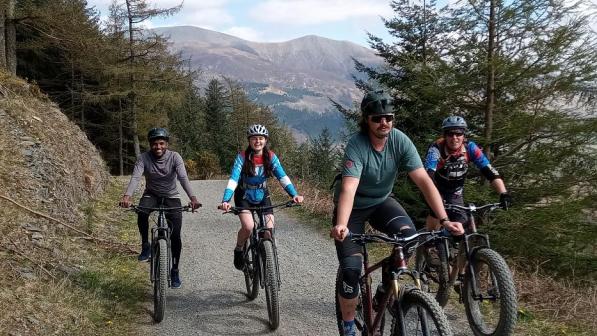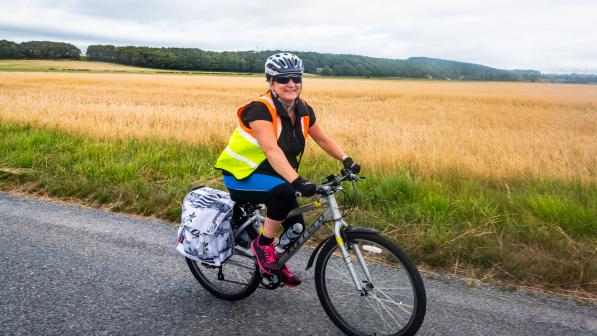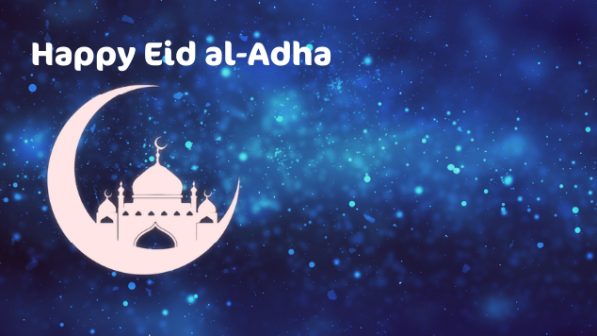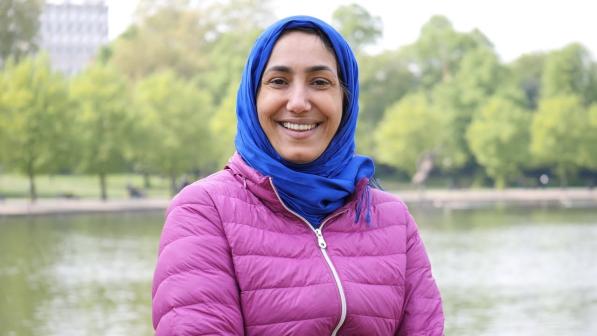Meet our volunteers: Alisha Kiselman

I only joined a cycling club just over two years ago, but I soon became a dedicated ride leader, breaking down cultural barriers around cycling. Having discovered that other modestly-dressed women cycle too, I decided to get a bike sometime after the first lockdown, and my life was completely transformed!
First Ramadan as a cyclist
Cycling while fasting for me personally has not been a problem at all. In fact, I generally find fasting OK, so the thought of doing some light to moderate exercise never daunted me.
My first experience was when I just started cycling regularly. A week before Ramadan, I joined a group - Kings Heath Park Cycling. They cycle a 26-mile route every Saturday and I loved it! I did not want to miss the next ride which happened to fall on the first day of fasting, so I decided to give the next ride a go, too.

Feeling great
I was, of course, a little nervous before the ride, not knowing how I’d feel, especially on the hills but, to my complete surprise, the ride went really well and I was feeling great. There were a few moments when I felt quite thirsty but nothing too difficult to bear. I then joined the cycling club officially and rode all of the rides that month, Saturdays, Sundays and some of the midweek evenings.
The only times I was felt slightly left out was when I’d not join the group at coffee stops and, being the only Muslim, this meant I’d sit by myself on a bench nearby. It was usually in a beautiful spot so I didn’t mind that bit of peace and quiet, it was a good opportunity to reflect and pray.
The Fasted 500 challenge
The next year, I found out about the Fasted 500 challenge, which encourages Muslims to stay active and ride regularly throughout the holy month of Ramadan. It is 500 kilometres (about 310 miles), so works out at just over 10 miles a day to complete.
Again, the physical prospect of the challenge was OK for me, but finding the time to do it was the main difficultly.

A Day in Hell
One of the craziest things we did during Ramadan, I think, was to ride the A Day in Hell challenge by Rapha! This is a 65-mile route that takes you through cobbles and dirt tracks, as well as road, in honour of the Paris-Roubaix Hell of the North classic.
At the time, I was riding a road bike with slick 30" tyres that were no good for a lot of the route but that’s the whole idea of it!
In preparation for this, a week before, I rode some of the track with a friend who was familiar with the route. I felt absolutely exhausted, although we only did 40 miles at a faster speed, I overdid it for sure!
Preserving energy
My lesson from the 'test' route was to take it easy and ride slower to preserve energy for the big day, and it worked!
My friend Usma from Nuhiha Cycling organised a group of five for the challenge, and three of us were fasting. We were all really mindful of taking care of ourselves, making sure we didn't get too tired or dehydrated, and looking out for each other along the way. Despite some challenging terrain, we managed to complete the ride, although we did have to shorten the route towards the end.
Our most important mission is to normalise the image of modestly dressed women on bikes. A few years ago, I wasn’t sure whether it was appropriate for a woman in a hijab to ride a bicycle but, seeing others do it, I overcame my feelings of hesitation
Alisha Kiselman, ride leader for the Ashiana Community Project
A fabulous outcome
Although very tough, it was an excellent experience and we all had a great day out in beautiful weather. It also made me fall in love with off-road riding and have since switched my tyres to be more gravel friendly, a fabulous outcome I think!
Riding in a hijab
If it wasn’t for our Cycling UK-affiliated community club, the Ashiana Community Project in Birmingham, which I joined shortly after I started cycling, I wouldn’t have made all the wonderful friends and wouldn't be a ride leader now!
Our most important mission is to normalise the image of modestly dressed women on bikes. A few years ago, I wasn’t sure whether it was appropriate for a woman in a hijab to ride a bicycle but, seeing others do it, I overcame my feelings of hesitation.

Never looking back
I have never looked back since joining the project, and I want to spread the joy of cycling to as many women as possible because it has transformed my life and I know it will transform everyone else’s who decides to give it a go!
We make ourselves seen on our local roads and I hope to be able to continue supporting local clubs as long as possible.
The end of Ramadan
The end of Ramadan 2023 for us will be celebrated today Friday 21 April with Eid al-Fitr. Coffee and cake stops - welcome back!
Eid Mubarak to all those cyclists who have been fasting this month.

Get in touch
Have you kept on cycling throughout Ramadan? We'd love to hear your story so please get in touch!



